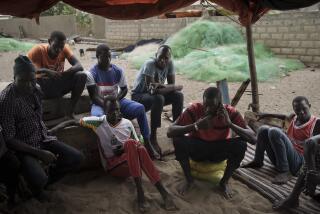In AIDS-Ravaged Africa, Senegal is a Beacon of Hope
- Share via
LOUGA, Senegal — A fling with a street trader some years ago ruined Mabeye, a former sugar factory worker. His wife was back home pregnant with their third child. Mabeye was lonely. He met a woman selling trinkets. They hit it off. She needed a place to stay. He took her in.
The woman was not a prostitute, Mabeye insists. She said she was married. They spent a week together having unprotected sex. She didn’t ask for money, but he still gave her some. Mabeye didn’t use a condom because, he said, it was his first act of infidelity, and his partner appeared to be clean.
In 1997, Mabeye was found to have HIV.
The story of the 31-year-old man, a devout Muslim who says he deeply regrets his actions and spoke on condition that only his first name be used, is common for Africa--but much less common for Senegal. This West African country has been hailed by the United Nations as a success story in the fight against the spread of HIV, the AIDS virus.
The prevalence of the disease here stands at about 1% of adults. That compares very favorably to Botswana, where almost 36% of adults are infected with HIV, or South Africa, where the rate jumped from 12.9% to 19.9% between 1998 and 2000, according to U.N. data. In rural Zambia, one in seven adults is HIV-positive.
Some African nations still downplay the epidemic, despite U.N. statistics indicating that nearly 70% of the world’s estimated 36 million HIV/AIDS cases and 90% of all deaths from the disease are in sub-Saharan Africa.
It was only in November 1999 that the Kenyan government broke a decade of silence and declared the disease a national disaster. In South Africa, President Thabo Mbeki has come under fire for questioning the link between HIV and AIDS.
But Senegal, like Uganda in East Africa, has tackled the HIV/AIDS problem head on. U.N. officials say Senegal’s record of achievement, although not perfect, is a reason for hope.
“The main responsibility is [with] the Senegalese people themselves,” said Zephirin Diabre, associate administrator of the U.N. Development Program. “What they have done proves that where there is a will to achieve, it can work.”
The success can be largely attributed to the willingness of the government, religious institutions and civil society to break taboos and become vocal about the threat, U.N. officials say.
When the first six HIV/AIDS cases were identified in Senegal in 1986, the government swiftly set up a program to protect the population. By 1987, a nationwide system of screening blood for transfusions had been put in place.
Senegalese scientists worked with their foreign counterparts to gather credible data that could be used as the basis for government policy. Millions of dollars have been spent on AIDS prevention programs, including a campaign to promote the use of condoms. Officials here say that use of condoms increased more than elevenfold from 700,000 to 8 million between 1988 and 1997.
Senegal also was the first African nation to successfully negotiate a 90% reduction in the cost of anti-retroviral drugs bought from international drug companies.
Price Is Sensitive Issue
The cost of AIDS drugs is a sensitive issue that has been increasingly debated in Africa.
The pharmaceutical industry sued the South African government to prevent it from enacting a law that would have given it access to cheap, generic AIDS drugs. The trial began Monday but was subsequently postponed. On Wednesday, Merck & Co. announced that it would sell two important AIDS drugs to poor countries at heavily discounted prices, and a manufacturer based in India applied for a license in South Africa to sell generic versions of AIDS medications.
Leading Senegalese AIDS specialist Souleymane M’Boup said that to qualify for cheap drugs previously, his country had to prove it had personnel trained to make use of them, set in place a mechanism for managing the purchase and ensure proper monitoring of patients.
So far, the impact of the cheap drugs has been small. M’Boup said they have been used in only 130 of the most critical cases. Moreover, treatment is not free for all. Patients have to pay as much as $100 a month, depending on their income. Mabeye’s condition is not considered serious enough for treatment. Besides, he is now unemployed and doesn’t have the money.
The anti-AIDS campaign has targeted vulnerable groups such as women, youths and prostitutes. Contrary to the practice of many conservative African nations, sex education has become part of the national curriculum.
Youth groups are using music and the arts to reach other young people. Popular Senegalese musician Baaba Maal spreads the message through concerts and chat sessions.
“The important thing for me is to make people understand,” Maal said.
At the main port in Dakar, the capital, through which about 7 million tons of cargo passes every year, authorities have been working with nongovernmental organizations since 1995 to educate workers.
Port authorities have set up condom distribution points, organized film shows and discussions, and circulated bundles of literature.
El Hadj Amadou Diop, chief doctor for the port, said the message is finally sinking in. Reported cases of sexually transmitted diseases among dockside workers fell from 3,926 in 1995 to 652 in 2000, he said. Reported cases of HIV/AIDS dropped from 24 in 1995 to 11.
“Many of the workers felt that HIV/AIDS was not real, that someone invented it, that it was not going to touch them, that it was something on television,” recalled Thiane Sarr, 32, a port mechanic. “But it was soon realized that no one can escape HIV/AIDS without proper protection. People are more careful now, with the information that is available.”
Some of that information has been provided by the Society for Women With AIDS in Africa, a nongovernmental organization that offers education on condom usage and how to recognize sexually transmitted diseases.
Clerics Back Campaign
Conservative Islamic leaders are supporting AIDS prevention activities. Imams have started making AIDS a regular topic in Friday sermons throughout Senegal, where more than 90% of the population is Muslim.
While the religious leaders insist that they encourage abstinence over the use of condoms, they acknowledge the importance of dispelling myths about the disease, such as the common theory that AIDS is a curse or a punishment by God.
“We go around informing and educating Muslims that it is a disease, just like any other, so a person who has AIDS must be accepted and cared for,” said Imam El Haji Ousmane Gueye.
Officials here acknowledge that there is still a long way to go.
“In terms of fighting the disease, Senegal has the best results in Africa, but the battle is not over,” Senegalese President Abdoulaye Wade said in a recent interview.
One of the chief obstacles is prostitution, which is officially tolerated and primarily driven by poverty. Per capita income here stands at less than $600 a year.
Registration of prostitutes was routine in Senegal for more than 15 years before the first AIDS cases were identified. Sex workers were subjected to regular health checks.
“So when HIV/AIDS came, it was easy to organize this core group of people, evaluate them, document them and train them,” said M’Boup, the scientist.
Free condoms are supplied on demand, and many prostitutes have been trained to educate other women in the trade. Still, sex workers continue to comprise the highest number of HIV/AIDS cases, and scant progress is being made to help them find other work.
Desperation pushed Ndeye, a 47-year-old mother of six, into prostitution eight years ago when her husband left her. Ndeye, who would give only her first name, insisted that she always used a condom, despite frequent offers of more money for unprotected sex. But she discovered four years ago that she had contracted HIV.
The Dakar-based Assn. for Women at Risk from AIDS, or AWA, a volunteer group, is trying to help prostitutes find other work. Former sex workers are given an initial sum of 100,000 Senegalese francs, the equivalent of about $142. But it can be hard to make a living.
A year ago, Lalla Mati Sow gave up selling her body to sell women’s clothes and cosmetics. But her income, which had been $15 to $22 an hour, now rarely tops $10 a week.
“I have relapses because sometimes I don’t get enough money from trading, so I have to go out and do [sex work] again,” said the fresh-faced 29-year-old. “I don’t like it. It’s not something I want to do, but I have no choice.”
But AWA lacks the money to do more, so since its inception in 1997, it has been able to help only seven former prostitutes become businesswomen, according to Ousmane Deme, a representative of the group.
Certain cultural practices such as polygamy and wife inheritance, in which a widow is remarried by her deceased husband’s brother or close relative, also have obstructed Senegal’s success.
These traditions are particularly life-threatening because the stigma of living with HIV/AIDS is so great that few are willing to publicly admit that they are infected or that a relative might have died from the disease.
“It is an issue which is taboo despite all the information campaign,” said Ali Ba, 29, who contracted AIDS while at university in Dakar and now helps run a local support group. His illness is a secret. “It’s very difficult to share that kind of information. That’s why it’s important to encourage different types of behavior and encourage people to speak out.”
More to Read
Sign up for Essential California
The most important California stories and recommendations in your inbox every morning.
You may occasionally receive promotional content from the Los Angeles Times.














